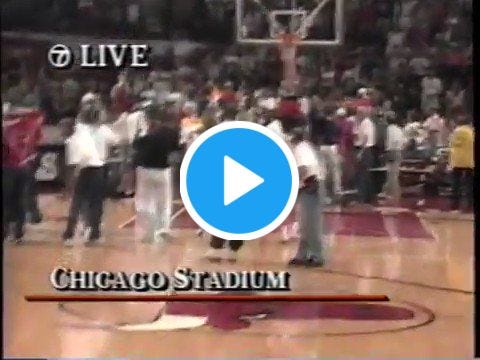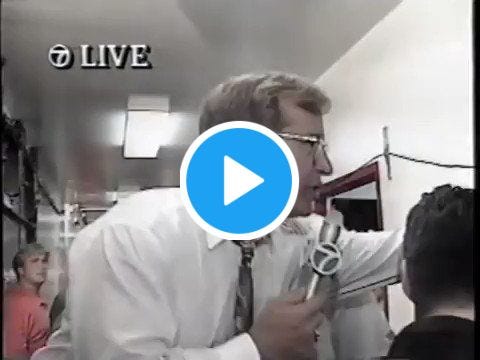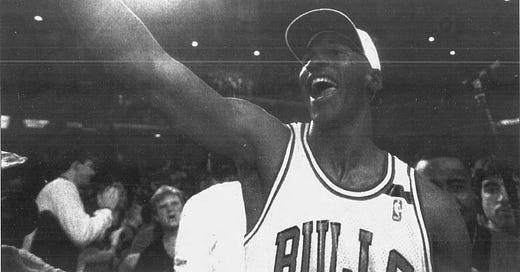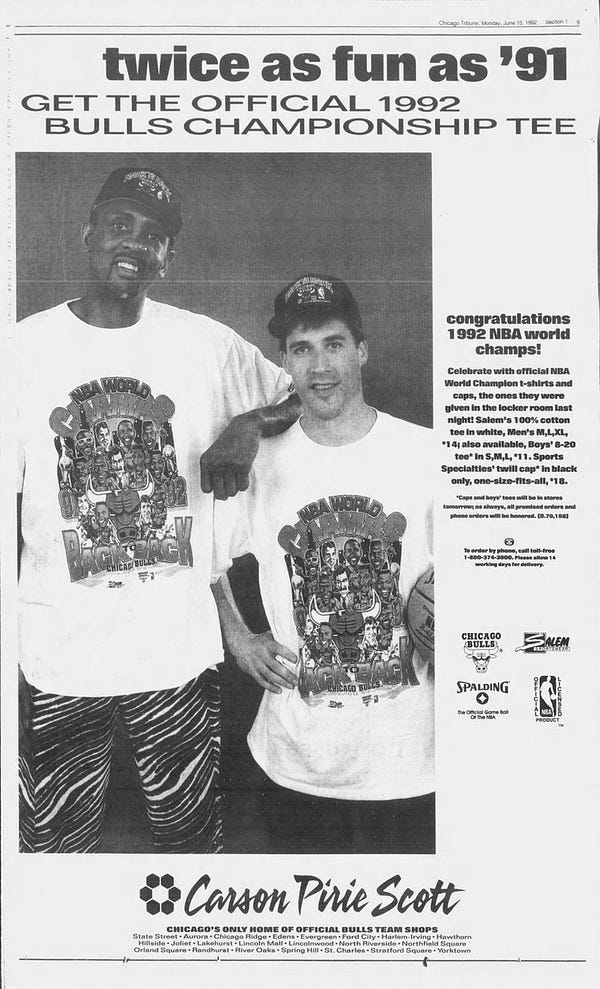The soundtrack of the 1992 championship comeback
"Rock and Roll Part 2" and the night the Bulls tore the roof off Chicago Stadium.

A Stacey King jumpshot set off one of the greatest musical memories in the history of Chicago sports. And Jim Irwin was the man who made it happen.
“Play 312!” Irwin’s boss David Brenner said to him through the headset. That was a code and Irwin, the sound engineer at Chicago Stadium, queued it up: “Rock and Roll Part 2” by Gary Glitter.
“Especially in the 4th quarter of a big game, the Gary Glitter song was always a staple,” Irwin told me in our interview last summer. “That was the one.”
Perhaps no game in the dynasty had a greater Gary Glitter moment — “duh-da duh-da duh-da duh-daaaaaa-da, HEY! duh-da-da-da-da” — than Game 6 of the 1992 Finals. When I connected with Irwin last year, Game 6 was one of the areas I was most stoked to hit with him. This was the famous 15-point comeback in the 4th quarter led by Scottie plus four players off the bench: B.J., Bobby Hansen, Stacey and Scott Williams, who thought that lineup was Phil Jackson’s white flag.
“I could see in his eyes the way he was talking in the huddle — he had taken a different tone,” Williams told me last year. “To the day I die, I’ll believe that.”
Williams thought Phil was playing for Game 7. That game was scheduled for three nights later, on a Wednesday. Irwin and others who worked the game were ready for that if needed — they already had their Game 7 passes.

For Irwin, the game began with his usual setup, though of course as a Finals game he was also navigating the NBC broadcast setup for Bob Costas doing pre- and post-game, which was on a stage above the organ loft where he was positioned, between the 2nd and 3rd balcony on the stadium’s east end. As Irwin was setting up the computer system that the Bulls used for music, a man approached him, holding a big felt bag with a drawstring.
“Could you hand this up to the people up at NBC?” the man asked Irwin.
“Sure, what is it?”
“The Larry O’Brien Trophy.”
“I took a peek, and I’m like, That’s it all right,” he told me, laughing. “One of their production people up there — they had a little ladder to get up to where they needed to get up to on their stage — and I handed it up to them. That was the first thing before the game.”
Three quarters later, the Blazers were up 15 and Irwin and everyone else in the house had reason to believe that the Larry O’Brien Trophy would remain in that felt bag for one more game. But then the Bulls bench took over. Everyone remembers Hanson’s famous corner-three to start the scoring in the 4th. It was the final shot of his nine-year NBA career. Less remembered is the steal he got on the other end immediately following his three. That set up a three-point possession: a free throw by King on a flagrant foul against Portland, followed by a Pippen shot to cut the Portland lead to 79-70.
The Blazers got a bucket, and then fouled King on the other end to set up another two free throw attempts. Up in the old organ loft on the east end of the stadium between the 2nd and 3rd balcony, Irwin’s classic night was heating up. When the Blazers called timeout before the King free throws, the Luvabulls came out as Irwin played the crowd-pleaser “What I Like About You,” a 1979 single by the Romantics.
King came out for the free throws, surrounded by the same lineup: Pippen, Hansen, Armstrong, Williams. The crowd was feeling it. King made both. Portland led 81-72. Williams rebounded a Blazers miss, and the Stadium crowd rose another octive. Pippen hit a bank shot; 81-74. The NBC cameras kept cutting to an elated Jordan on the Bulls bench, towels draped on his shoulders as he pumped his fists in celebration and support. A questionable double-dribble call against Portland gave the Bulls the ball and the crowd another shot of electricity. Blazers coach Rick Adelman called another timeout, and again the crowd responded with verve.
High above the frenzy, Irwin waited for the next music opportunity. It came two possessions later. Armstrong hit a jumper to get the Bulls to five. The refs called an offensive foul on Buck Williams. And then King leaned into Williams, who flew backward to the floor, trying to draw the charge. The refs swallowed their whistles and King hit the jumper.
Blazers 81, Bulls 78, with 8:36 remaining. Portland called another timeout. Brenner hit Irwin with the order.
“Play 312!”
Before the players on the court even reached the bench to accept the high-fives from MJ, Horace and others, Irwin had pressed play on “Rock and Roll Part 2,” letting it rip through the team’s computerized sound system. The song’s famous drum beat and chant engulfed the crowd.
“I want to say that’s probably the most we ever played the “Rock and Roll” song, Gary Glitter,” Irwin told me. “We played it twice in the fourth quarter when the Bulls were rallying, during the timeouts, and then when they took the lead, and then obviously at the end of the game.”
Even today, I can’t think about the Game 6 comeback without hearing “Rock and Roll Part 2” — and hearing the fans shout “HEY!” in unison. Everyone could feel the energy and the changing tide.
“Michael’s gonna come in and rock this,” NBC’s Marv Albert said off the air during the timeout. The Luvabulls were dancing again. Benny the Bull was running in circles swinging a giant white Bulls flag with a red Bull. The Bulls blimp was over the fans. The scoreboard showed a digitized Benny jumping in front of an American flag. “That’s what’s going to happen,” Marv continued. “It’s over.”
Talk about a great call. The Bulls were on a 14-2 run. The stadium swelled with energy. Every fan in the house chanted “HEY!” and pumped their fist with Gary Glitter. Jordan entered for the hero Hansen.
“Take over, Michael,” Hansen whispered to him. “Take us home.”
“We’re going to get you a ring,” Jordan replied.
“This crowd senses that it is slipping away from the Portland Trail Blazers,” Marv said when NBC came back on the air. Drexler got a bucket to get the Blazers back up 5; they would never lead by that much again. Pippen and Jordan got a pair of baskets to get the Bulls within one. Adelman called time and Irwin teed up Gary Glitter again. Again the crowd sang along. “HEY!”
Portland would hang around a bit longer, but their time was up. Pippen (11 points, one steal) and Jordan (12 points, two steals) led the way in the 4th quarter. Pippen and Williams played the entire fourth for the Bulls, who ended the game with those two plus Jordan, Grant and Paxson on the floor. From high above the action, Irwin watched Paxson grab the game’s final rebound.
“You always remember Paxson dribbling out the clock and throwing the ball up in the air,” he said. “Everybody went nuts.”
For Irwin, Brenner, P.A. announcer Ray Clay and EVP of business operations Steve Schanwald, the final buzzer is when the real fun began. The Bulls won 97-93 and the court was mayhem. The team ran to the locker room to celebrate, Hansen holding the game ball, which he would then give to Jordan. The standard championship locker room scene was underway, only this time, it was happening in Chicago. No Chicago team had won a championship at home since the 1963 Bears beat the Giants 14-10 at Wrigley Field.
Obviously the Bears had the NFC championship win in January of 1986, but the Super Bowl was in New Orleans. The Bulls had defeated the Lakers the year before in L.A., and even our two Eastern Conference Finals victories were on the road: 1991 in Detroit and 1992 in Cleveland.
Chicago fans were hungry for a celebration. The players gave it to them.
On the headsets, Brenner gave Irwin and Ray Clay the update. “Steve told me the players are going to come back up to celebrate with the crowd,” Irwin recalls Brenner saying. “We’re going to have a little mini rally right here, right now.”


Irwin was thrilled. “We went back into Sirius, the intro theme, as they were coming up from the tunnel downstairs, coming up onto the court again,” he said. “Then from that, Ray did a thing again. The lights weren’t out or nothing obviously, and then Jordan, the shot of him jumping up on the scorer’s table holding the ball and all that, and hooping it up — everything.”
Next, the team went into what Irwin calls “our big staple songs.” “We Will Rock You.” “We Are The Champions.” And of course “Rock and Roll Part 2.”
“It was a big party,” he said. “Didn’t get out of it until real late. We were able to go back downstairs after the crowd started filing out, and I remember that long hallway leading to where the Bulls locker room was on that east end of the stadium downstairs. I’m walking over and I’m talking to Timmy Hallam, the Bulls media director. He’s still there, he’s been there forever. We’re talking and he’s like, ‘This is great!’
“We’re just shooting the shit, talking, and here comes Michael popping by us with a big cigar, with his championship hat on, holding the trophy. He’s hooping it up and there he goes, and back into the locker room. It was a big party. It was awesome. Then we did Grant Park a couple days later.”


-
-
-
New interview this Friday for paid subscribers:
My conversation with John Beachum, the Carson Pirie Scott executive whose idea it was for the department store to become the official team shop of the Chicago Bulls. If the day after a Bulls championship you went to Carson Pirie Scott to get your championship t-shirt, John Beachum is the reason why.
This will be the next story that is exclusive to subscribers. Upgrade now to a paid subscription and get the scoop! The price remains Pippen a year or Paxson a month.
Preview from my interview with dynasty-era Carson Pirie Scott executive John Beachum:
Now, remember, the delineation of being the official team shop meant we got first shipments and merchandise, which was important. JCPenney would get the merchandise, Montgomery Wards would get the merchandise, but they wouldn't get it until our initial allotments were fulfilled. Then they would fill the others. The replenish system, again, worked the same way. Those were the key competitive advantages.







